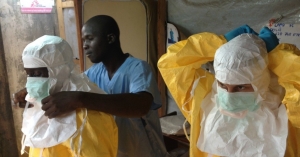
Latest cases prompt clarification: Ebola can be spread by sneezing, coughing to people 3 to 6 feet away
(Photo: European Commission DG ECHO/Flickr/Creative Commons)
By Miriam Raftery
October 2, 2014 (Dallas)--The first case of Ebola diagnosed in the U.S. occurred this week in Texas, where the patient was initially sent home from a hospital. A search is underway for about 100 people in the Dallas area who may have been exposed to the Ebola patient, who had traveled here from Liberia. Dallas officials sent a reverse emergency call to 11,000 area residents to warn them about the situation, including parents at four schools where several exposed children attended class. Four family members have now been placed in quarantine: http://abcnews.go.com/Health/texas-Ebola-patients-contacts-now-reach-100/story?id=25912405 United Airlines has also contacted patients who were onboard the flight, though it is not believed the patient was contagious yet while on board.
If you come within three to six feet of a person with Ebola, you could contract the disease, though the disease itself is not airborne. But droplets from a cough or sneeze can travel that far, the New York Times reports. See: Understanding the risks of Ebola and what direct contact means. Hugging or even just touching an Ebola patient or items they have handled can also transmit the illness through sweat or other body fluids. These details are troubling, since it means travelers could potentially be at risk on a plane or subway, in a hospital waiting room or other location if in proximity to someone with Ebola, a disease that has killed half of its victims.
In West Africa, the disease has sickened thousands in the worst Ebola outbreak ever. For those traveling to Africa, be aware that the disease can also be transmitted by eating or handling bush meat, or meat from wild animals.
The Centers for Disease Control has estimated that by January, the number of cases there will likely reach between a half million and 1.4 million people. http://www.cdc.gov/vhf/Ebola/outbreaks/2014-west-africa/qa-mmwr-estimating-future-cases.html
Cases have been found in Liberia, Sierra Leone, Guinea and Nigeria in recent weeks. The disease originated in Zaire (now the Congo) but no recent cases have occurred there. The U.S. State Department has issued travel warnings for these areas, urging that non-essential travel be avoided to the first three countries and that precautions be followed for travel to Nigeria. http://travel.state.gov/content/passports/english/go/Ebola.html
There is some good news, however; Nigeria appears to have halted its outbreak; no new cases have been diagnosed since August 31st and the incubation for suspected cases has now passed. Earlier fears had been raised over the potential for a major epidemic in the are due to crowded slum conditions. http://www.nytimes.com/2014/10/01/health/Ebola-outbreak-in-nigeria-appears-to-be-over.html
As for the patient diagnosed in Texas, media reports have indicated that he was not truthful when asked before boarding a plane in Liberia if he had been exposed to anyone with Ebola. At the Texas hospital, he did truthfully state that he had been in Liberia, but the information was inexplicably not passed along to doctors. The patient’s symptoms were not typical and he was not running a fever when he first came to the hospital.
An NBC photojournalist working in Liberia, has now tested positive for Ebola. He is the fourth American to test positive for the disease. He is being flown to the U.S. for treatment: http://www.msnbc.com/rachel-maddow/watch/Ebola-diagnosed-in-cameraman-working-with-nbc-337201731833
Two doctors who contracted Ebola while treating passengers in Africa have also been treated in the U.S. One recovered and the other died.
Ebola has an incubation period of two to 21 days. Patients are not contagious when they do not have symptoms. The disease is fatal in the majority of cases and there is currently no cure, though experimental treatments showed promise before supplies of the experimental drug made by a San Diego biotech company ran out.
San Diego is home to thousands of African immigrants, but most are from East Africa, not West Africa where the current outbreak is occurring.
Still the potential exists for a returning American or visitor to bring the disease to our region.
County Public Health Officer Wilma Wooten assures that San Diego has containment procedures in place and that an Ebola epidemic in San Diego is unlikely, however.
City News Service reports that Wooten says the local medical community has been alerted to be on the lookout for signs of the virus — (including fever, severe headache, muscle pain, weakness, diarrhea, vomiting, abdominal pain, red eyes, and unexplained bleeding or bruising). Health workers are also instructed to ask anyone with any of those symptoms about their recent travel history.
"If a case of Ebola were to happen locally, the county of San Diego has well-trained staff that would investigate and locate any recent contacts of the person," Wooten said, KPBS reports. "We would need to find everyone who had direct contact with the person when they were showing symptoms and isolate these contacts if they were also showing symptoms to stop the spread of the disease."







Recent comments